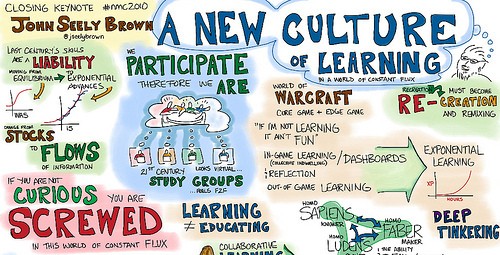The Cascadia Subduction Zone isn’t the only thing that’s stuck in our world, and unlike a catastrophic events forecast for the west coast at a time unknown, we are in need a tectonic shift in the way we approach language learning. Tremors are felt in classrooms across the world where teachers are shifting the way students learn. Over the past five years, these tremors and small magnitude earthquakes have been frequent in my classes.
The most iteration of my action plan is an evolution from modest beginnings as a Personalized Learning & Inquiry based approach to languages, which grew into exploring feedback and its immediacy in conversations without derailing students. This year my action plan is based around Standards Based Assessment and allowing students the opportunity to challenge language standards across all competencies of language based on the CEFR & DELF with speaking as focal point.
What really led me to this point was co-hosting a CISOntario French Teachers Conference #CISDELF where the Keynote Speaker Denis Cousineau talked about dropping themes and vocab worksheets. Nothing new with worksheets but keeping language wide open and completely skill based was a major shift – moving from units to cycles was hard for a lot of teachers to wrap their minds around, let alone students!
I started with a few Add-Ons to make my life simpler. I converted a PDF of CEFR language requirements at each of the levels (A1, A2, B1, B2) into a Google Doc. With the Add-On Doc to Form which resulted in all of the standards being filled into a form which was DocAppended to an individual Google Doc for each student and a Drive folder that acted as a portfolio of their learning.
 Students across my classes were open to the approach despite serious trepidation – some tremors and perhaps a 2.0 magnitude earthquake. We moved slowly, scaffolded learning and discussed about how they might best demonstrate the acquisition of the skill. Once they had practiced in groups and individually, they could challenge the performance task associated with that skill; thanks to @ehitchcock for the motivation on this! I added a section at the bottom of the form where they could submit the proof of this skill (via link to Google Drive), and things were rolling!
Students across my classes were open to the approach despite serious trepidation – some tremors and perhaps a 2.0 magnitude earthquake. We moved slowly, scaffolded learning and discussed about how they might best demonstrate the acquisition of the skill. Once they had practiced in groups and individually, they could challenge the performance task associated with that skill; thanks to @ehitchcock for the motivation on this! I added a section at the bottom of the form where they could submit the proof of this skill (via link to Google Drive), and things were rolling!
“didn’t we do this before”
A 2nd set of tremors came in when it came time to choose their own skill after having been walked through Listening, Reading, Speaking (presentational & interaction) and Writing. Once they were given free reign within the Reading section: I heard comments like “didn’t we do this before”, “I feel like we’re just repeating what we did last week” despite being asked to use different types of resource and completing slightly different skills. This made me wonder… How do they define learning? Does it need to be more linear? Can we jump back and forth? What structures are missing? Perhaps I needed to chunk the standards better? If a student demonstrates a skill, are they done with that skill or can we revisit it to hone and refine it?
We tweaked a few things and got through it, and at the end of the cycle, the reviews were mixed. Some really enjoyed that style of learning and others felt like it was too loose of a framework. The best feedback I received was recently when a Grade 12 Core French student exclaimed “You’re the only one in Grade 12 giving us choice, and the inconsistency of that can be stressful”. This was after a great discussion around marks and what they mean, and why I don’t give vocabulary quizzes so they can all get 100% to boost their marks.
 I told them “I failed you, I’m sorry!” He was quick to respond that I was a good teacher and that wasn’t what he was saying. But I replied “No, I have. My goal at the beginning of the year was to empower to take control over your learning, I wanted to be your coach, as you became an independent language learner for life with all of the tools and skills to be able to do it for yourself.” The conversation continued with pleasantries and we got back work. The main obstacle for these students was time.
I told them “I failed you, I’m sorry!” He was quick to respond that I was a good teacher and that wasn’t what he was saying. But I replied “No, I have. My goal at the beginning of the year was to empower to take control over your learning, I wanted to be your coach, as you became an independent language learner for life with all of the tools and skills to be able to do it for yourself.” The conversation continued with pleasantries and we got back work. The main obstacle for these students was time.
The way language is learned in my classroom has changed tremendously over the past 5 years and continues to evolve. I am hopeful that as our culture of learning at the school shifts, and we see more choice in other classes, students will feel empowered to do great things with their learning and I am definitely looking forward to being a part of that!
This has left me with a number of questions and nearly constant reflection of how to make this experience more meaningful and empowering for students. Which has led to my Google Innovator Application for London 2017, but that’s for another time. Here’s my vision video as a teaser.

What an honest reflection. I suspect that you are much harder on yourself than necessary! It doesn’t sound to me like you have failed in your attempts, but that you are perhaps ahead of your students in the approach to learning. I have found that in my grade 11 math class I had to slow down the changes to their learning style. I want them to be more independent, and to guide more of their own discussion around problem solving. They are happy with teacher-led discussion and their current (amazing) level of participation, and feel like they are learning a lot already (so no *need* to change).
It takes a few years for these changes to become accepted as a “normal” way of learning for students, which gives you plenty of time to perfect your approach and methods.
Have fun!
Great reflection. If we are to look at this through the lens of design thinking, you’ve just received more feedback that will allow you to further see through the lens of the ‘user’. Now you can return to “defining” the problem, and iterating a new prototype 🙂
Thanks for this honest reflection. You’re being a great role-model for the students, and I do hope that you share this with them!
garth.
@ddoucet I embedded the video into the post for you. Such a good vid!
Thanks for sharing your classroom journey with us. Open, honest and deeply reflective. A great post to share with all our language teachers.
Thanks @jmedved!
Hi Derek,
I’d really love to talk to you about what you’ve been doing in your French classes. I’m wondering how you begin your “cycles” (as opposed to units) and what this looks like throughout the year. What changes have you made to the kind of feedback you give and its frequency, and how has this improved student achievement – and is this done in English or in French? Also, I’m interested to know what you’ve done to put oral communication as the focal point. Finally, if you’ve gotten rid of vocabulary worksheets and units, and if students are working at their own pace on their individual progress, where does the teaching of grammar fit in? Is it a lesson to the class or is it embedded in the individual feedback you give students, based on what they need to be able to communicate their ideas?
Let’s talk!
Kelly